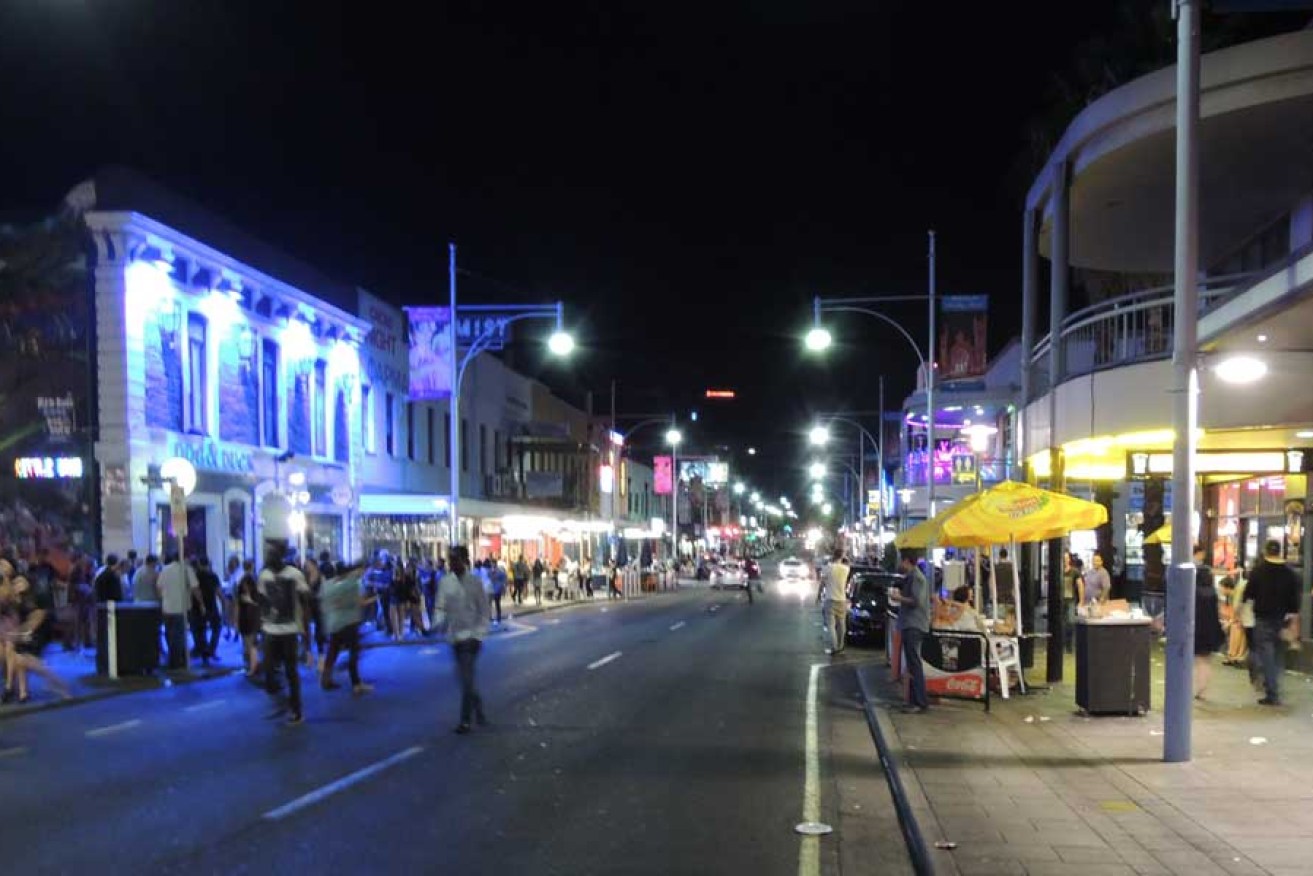Safety worries over budget cut to taxi rank security
Parents concerned for the safety of their children in the city late at night will have an added worry with the state budget axing funding of Adelaide’s monitored taxi rank concierge service, says Lord Mayor Martin Haese.


Hindley Street after dark. Photo courtesy Tony Tropeano
The Marshall Government’s first budget, handed down by Treasurer Rob Lucas this week, ended Government funding for the staffed concierge service that manages late-night patrons at taxi ranks in Adelaide’s CBD, Glenelg and Port Augusta.
The program provides security guards and attendants to monitor the ranks and guide patrons into taxis.
Budget documents announcing that the program is to be scrapped – saving the Government about $190,000 a year – acknowledge that it “was designed to facilitate the safe dispersal of patrons from entertainment venues and precincts”.
Haese told InDaily this morning he was “disappointed” that the Government was axing the program, which he said gave parents peace of mind when their children were finding their way home from the CBD.
“The monitored taxi ranks are extremely important … I hear this from many parents – they always take comfort (that) a number of these key taxi ranks are monitored by trained staff,” Haese told InDaily this morning.
“Safety is the absolute foundation stone of a good city.”
Taxi Council president Steve Savas told InDaily the service prevented disorderly behaviour from escalating into violence.
“We’re very disappointed,” he said.
“Luckily, we haven’t had much violence at all (at taxi ranks) because we’ve got security people there – prevention is better than cure.
“We would like to provide a service to look after our passengers … late at night, when things get a bit ugly.”
In July, the Taxi Council said the Adelaide Airport had begun phasing out funding for the concierge program under the airport’s Taxi Industry Fund, but the airport said at the time that it “continues to fund and manage the operation of the airport taxi rank including the employment of taxi concierges and maintenance of facilities, in collaboration with the Taxi Council of SA”.
Savas said this morning that there is now no funding for the concierge program, and that the industry had yet to look at alternate funding sources.
Lucas’ state budget also cuts funding to the Safe City Grant program, which helped fund the maintenance of the Adelaide City Council’s of CCTV cameras in the CBD.
The cut will save the Government about $110,000 a year.
“Any reduction in funding that could result in compromising the safety of the city is clearly something that, as Lord Mayor, concerns me,” said Haese.
But he said the budget contained a number of measures that would benefit the city.
The Government has committed $7 million to replace the tram tracks between Victoria Square and South Terrace, $3.3 million to upgrade the City South tram stop and $37 million over two years to install a right-hand turn at the King William Street intersection with North Terrace.
A further $600,000 will be spent commissioning a business case for a tram extension – a city loop – for Adelaide’s CBD, although the funding is a reallocation of existing resources in the Department of Planning, Transport and Infrastructure.
Haese said he was also pleased by $500,000 in State Government funding to put a roof on Chinatown, but urged the Government to invest more heavily in the project.
He said the area was an important drawcard for tourists and international students.
For the fourth year in a row, the council has been knocked back in its request for the State Government to enter into a funding partnership to upgrade Grenfell Street and Currie Street.
The east-west corridor is the most heavily trafficked road for buses in the state.
Haese said that since the opening of the new O-Bahn, the number of buses traversing the road had increased to about 2800 a day, increasingly damaging the well-worn bitumen, which features dips and cracks at many bus stops.
He said the street needed a wholesale upgrade to improve the surface of the road, plant more trees, widen footpaths and upgrade bus stops.
“Grenfell Street is the busiest street in South Australia when it comes to the provision of public transport,” said Haese.
“The substrate and the surface of Grenfell Street was never really constructed for such frequency (of bus services) and weight (of buses).”
Haese said that he had an assurance from Transport and Local Government Minister Stephan Knoll, however, that the Government would fund the city bikeways project at least until June 2019.
The $12 million allocation was for the construction of North-South (Frome Street-Frome Road) and East-West separated bikeways.
But it is clear the North-South bikeway will not be complete before then, because of the Adelaidean hotel complex construction on the North Terrace to Rundle Street section of Frome Street.
Haese said, however, that he had no reason to think the government was not a willing partner in the East-West bikeway project, despite the looming funding deadline.




